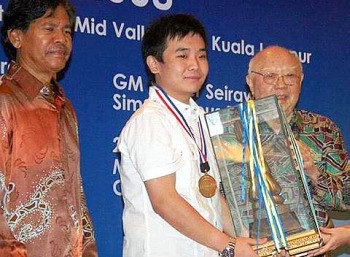A FEW weeks ago, I was complaining that the IGB Arthur Tan memorial Malaysia open chess championship lacked one essential element: the presence of past champions who were willing to come back to defend their titles.
In 2004, China’s Ni Hua won the Malaysia open and promptly forgot to come back the following year. In 2005, Wang Hao won the Malaysia open and also chose not to return to defend the title the following year. So did Dao Thien Hai who won the Malaysia open in 2006 and hasn’t reappeared on our shores since.
But at least, the Malaysia open 2007 winner, Li Chao, agreed to play this year, foregoing the once-in-a-lifetime opportunity to stay back in China to watch the Beijing Olympics up close. (In fact, we had more than a handful of people from China who preferred to play chess in Kuala Lumpur.)
 Chinese grandmaster Li Chao, with MCF president Tan Sri Ramli Ngah Talib (left) and former MCF president Datuk Tan Chin Nam. – Picture courtesy of Edwin Lam
Chinese grandmaster Li Chao, with MCF president Tan Sri Ramli Ngah Talib (left) and former MCF president Datuk Tan Chin Nam. – Picture courtesy of Edwin Lam
So it was good of Li Chao to come. At the back of my mind, I was thinking that this was a good chance to test his abilities and see whether he was made of sterner stuff or just a flash in the pan.
But Li Chao being Li Chao, he created a bit of a drama and anxious moments here even before he could play his first move. The organisers received a call from him on the eve of the Malaysia open that his flight into KLIA would be delayed because, in his words, “the plane caught fire” and he could only arrive after the first round has started.
Nevertheless, he did arrive safely the next morning and promptly settled down into the tournament to score his first point and a second point and a third point before someone managed to steal a draw from him. He even lost in the sixth round to Indonesia’s Susanto Megaranto but his strongest point was that he kept bouncing back.
After this loss to the Indonesian, Li Chao reeled off four consecutive wins against some of the strongest opponents in the competition – Wang Li, Zhang Zhong, Marat Dzhumaev and Lim Yee Weng – before he settled down with a final-round draw with Darwin Layto.
Li Chao actually won this Malaysia open with a round to spare. His win against Lim placed him in an unassailable position because it really didn’t matter whether he won, drew or lost his game in the last round. At the very worst, he would have been crowned champion on a tie-break.
However, a share of the first prize wasn’t what this Chinese grandmaster was after. It should be nothing less than a draw and that was what he got from Layto.
So in Li Chao, we now have a champion who had sealed his place in Malaysian open chess history. Never before have we had a champion who could defend his title successfully but this guy has done it. Really incredible and admirable.
Mind you, Li Chao wasn’t by any means the firm favourite to win this year’s tournament. That tag belonged to Zhang Zhong, a grandmaster from China who is now a permanent resident in Singapore.
But throughout the tournament, Zhang could only play second fiddle. It wasn’t only to Li Chao but also to Dzhumaev and Susanto as well. For a while, Dzhumaev and Susanto were ahead of him in the standings.
But Susanto could not keep up the pace and he fell back while Dzhumaev lost two critical games: one to the winner and the other to Zhang himself. That crucial win hauled Zhang up to joint second place with two other players going into the final round and here was where he made it count with a win while his rivals could only draw their games.
So in the end, Zhang’s consistency told and he finished in second position. Perhaps it was a tad disappointing not to see the tournament favourite justify his seeding but nevertheless, it was satisfying to see a champion successfully defend his title.
Top standings (final): Li Chao 9 points; Zhang Zhong 8½ points; Marat Dzhumaev, Susanto Megaranto, Darwin Layto, Drazen Sermek, Ashot Nadanian 8 points each; Li Shilong, Steven Yap Kim, Ronald Dableo, Zhang Ziying, Irine Karisma Sukandar 7½ points each; Lim Yee Weng, Zhou Weiqi, Yang Kaiqi, Xiu Deshun, Julio Catalino Sadorra, Wang Li, Richard Bitoon, Emmanuel Senador, Wan Yunguo 7 points each. Total: 112 players.
